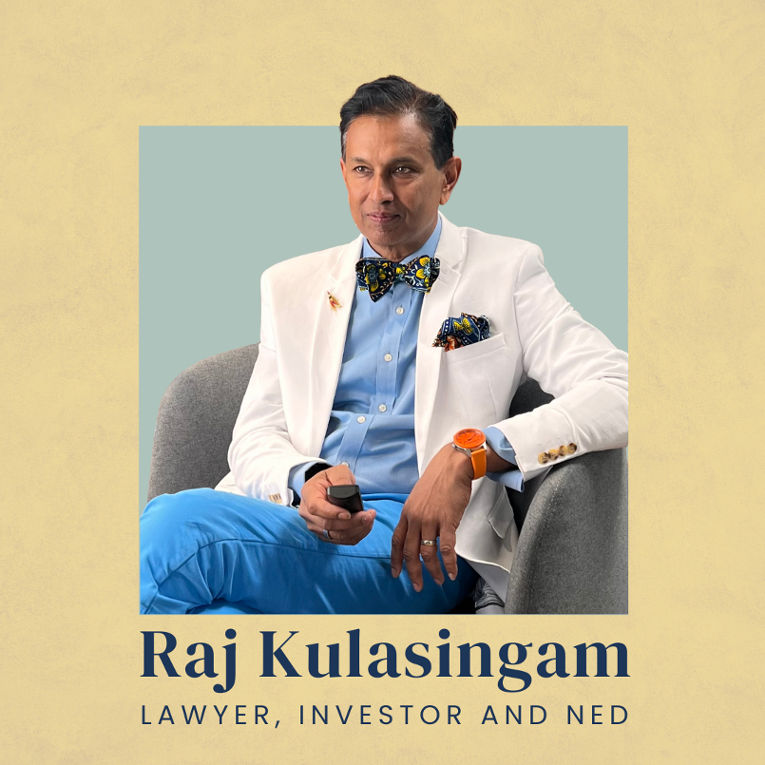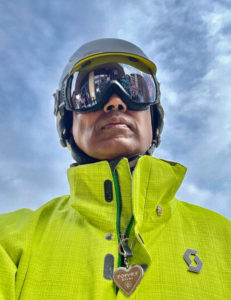CATEGORIES
Inclusion and Impact | People We Admire | Relationship BuildingOverview:
- Raj Kulasingam was born in a small town in Perak, Malaysia.
- From his experiences working in diverse fields and regions, he is illustrative of the power of learning by doing, understanding one’s own limitations, and continuously building relationships.
- His impactful career in law, business and investment is a testament to resilience, curiosity, and the importance of making human connections and being generous.
- For Raj, the journey of his career emphasizes the critical role of empathy, adaptability, and the pursuit of meaningful goals over mere financial success.
1. What was your childhood like, and any pivotal moment that might have led you to where you are today?
I was born in a small town in Malaysia called Slim River, a place most people pass by when traveling between Kuala Lumpur (the capital of Malaysia aka KL) and Ipoh (a larger town north of Kuala Lumpur). No one visits Slim River unless they must stop for a break in their (then) drive to or from Kuala Lumpur. My father was a foreman on a rubber and palm oil estate, and my mother was a housewife. I grew up with one younger brother and two older sisters. My early memories are of watching my father wake up at 4 am to supervise all the laborers cutting down palm oil fruit or tapping rubber. We had an idyllic life on the plantation, but it had its limitations and opportunities were few and far between. We had no electricity after nine o’clock, and very few people had televisions.
When I was three, I was taken to KL by my uncle, who worked as a civil servant for the Ministry of Education and my aunt, a secondary school teacher. I suppose my parents must have thought that since the schools in Kuala Lumpur were better, I’d have more opportunities. So, I grew up with my uncle and aunt in KL and was later adopted by them. I’m in the unique position of having two sets of parents, which sometimes confuses my children because they have four grandparents on my side.
After finishing school in KL, I told my dad I wanted to study law. In Malaysia, getting into university as a non-Malay (i.e. not Bumiputera) student was challenging due to the system of positive discrimination, so I had limited options. I convinced my foster parents (i.e. my uncle and aunt) to take out an expensive loan and send me to the UK to study law at Warwick University. This was a big step for someone who had never left Malaysia and was state school educated.
My first international flight from Kuala Lumpur to London at the age of 21 marked the beginning of my adventures in the UK and beyond. It taught me the importance of embracing the unknown.
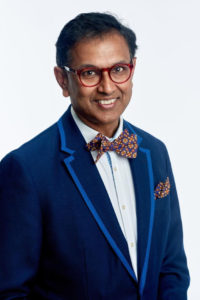
2. Could you tell us more about the work you do in Africa and what led you to take up these projects?
I initially became a barrister after university as this was the path taken by all Malaysians who qualified as lawyers in the UK where they were going to go back home to practice. However, I realised very quickly that being an advocate was not something I wished to pursue as a career. I wanted to work in an international environment with London being the starting point. So, I decided to stay in London, where I would make a home with my wife and three sons. Looking back at life, there’s often a pivotal moment for each one of us that sets us on our paths.
The pivotal moment for me was when I applied for a legal training contract after university at one of London’s top corporate law firms at the time called Gouldens (now Jones Day) and was interviewed by a wonderful partner there called Claire Deansley. In those days it was very difficult to get a legal training contract if you did not have a British or EU passport and most law firms were unwilling to apply for a work permit for applicants. I had already been rejected by more than a dozen law firms when Claire went out on a limb to organise a work permit for me and offered me a training contract with Gouldens. So began my legal career in the UK. My time at Gouldens saw me go from being a litigator to doing shipping to corporate M&A.
After five years at Gouldens, I wanted a new challenge and started to look at job adverts. In those days there were no LinkedIn or online job posts. We used to look at adverts in magazines and use recruitment consultants. By chance, I found an advert in the “Lawyer” magazine which said ‘oil and gas lawyer wanted, no relevant experience required’. I thought this could be a challenging and interesting area of law and I fitted the bill as I had no relevant experience!
After a series of interviews, I received a formal letter (no email those days!) offering me the job as a solicitor in the Energy and Infrastructure department of a law firm called Denton Hall. So began the next stage of my legal career at Denton Hall’s office at 50 Chancery Lane as an energy and infrastructure lawyer.
It was a quick and steep learning curve on the job as I got to learn and advise on completely new areas of law and business. This was much more international in scope which also gave me the chance to travel and meet people from all walks of life. I advised on road, rail, oil and gas, water and other projects all over the world. It was fast paced, hard work, long hours but ultimately rewarding. My work took me to Abu Dhabi to privatise the water and electricity authority at a time (1998) when there were only two international hotels there! Dubai and Ajman (the smallest Emirate) were two other UAE destinations that I frequented between 1998 and 2004 advising on a number of projects there.
Fast forward five years of hard and rewarding work with long hours (often past midnight regularly at the office – no WFH then) after leaving Gouldens, I was made partner in the law firm Denton Wilde Sapte – today known as the global international law firm Dentons.
My work in Africa started with a hydro project in Zambia. Like many things in life, it was not planned. One day, I got a message from the head of my department that a client needed some advice on a hydro project in Zambia and wanted a lawyer to turn up in Lusaka to advise on this. He asked me if I would go. Without any hesitation I said yes and a few days later landed in Lusaka, Zambia. When I met the client, I realised that he did not have a proper financial model or a financial adviser. So, I made a few calls and managed to find a PwC partner in Nairobi called Vishal Agarwal. He agreed to take on the role and came to Lusaka to meet with me and the client. Again, another fortuitous event as Vishal became a close friend and business partner in many business ventures later.
This experience opened doors to more mandates as I built my network and expertise across Africa including Nigeria, Ghana, Kenya, Egypt and South Africa. This experience and network also seeded my eventual investment and other activities in Africa and beyond.
Africa became the new frontier for me, both as a lawyer and eventually as an investor and my excitement and love for the continent.
3. How did you start your investment journey, and what has it taught you?
My journey as an investor began with a chance encounter. I met (what was then called!) an internet entrepreneur named Christofer Solheim in the elevator of the apartment I used to live in. I was in the elevator going to my apartment and he got into it with champagne and glasses in his hands going up to his penthouse apartment. A few days later, he invited me for breakfast , and when I visited his penthouse flat, I saw 20 computer screens— which was very unusual in 1992.
Christofer and I became friends and spent many evenings talking about investments and business as I got sucked into the world of the internet entrepreneur. A few years later (by this time Christofer had built and sold 3 businesses) he told me that he had founded a media analytics company called 2B Reputation Intelligence and asked if I wanted to invest. Although I was totally new to the investing game, I liked the business plan and believed in Christofer’s abilities so I gave him some money with very little due diligence or understanding of the opportunity. Three years later, he returned four times my initial investment as 2B was sold to Factiva. This experience was eye-opening, but not all my investments were successful. I learned a lot from both successes and failures.
30 years after I met Christofer, I sit on the board of a company he founded in 2007. It’s been a roller coaster ride, but the company is still operating. We’ve had every single problem you can imagine but we keep pushing. It’s not easy!
In 2010 (after 15 years at Dentons), I felt that I wanted a new challenge and a change from being a full-time fee earning partner at an international law firm. So, I resigned from the Dentons partnership and took on a business development role at Dentons. It was a big change but I believed that I was good at building relationships, getting clients and providing strategic advice and guidance so I thought I would try it out. 14 years later in 2024 I continue to have the same role at Dentons which I combine with my other interests as an investor and NED – what people today call a portfolio career.
I think the most satisfying thing about being an investor is that I’m not investing in companies, I’m investing in people. Having an opportunity to watch an entrepreneur establish themselves and grow is immensely rewarding. The most important thing I understood from this is that sometimes the best way to learn is by doing. Each investment is a learning experience, even if it doesn’t turn out as planned. There are many twists and turns and you need resilience to be an entrepreneur and an investor.
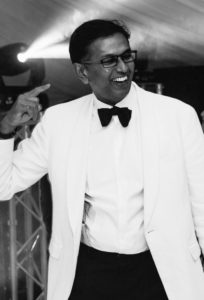
4. Could you share what support, if any, your mentors have given you during your career?
I have not had many mentors in my life, but a few people did have an impact on my life and career. Early in my investment career, I read a book by Jason Calacanis called Angel. In the book, Calacanis refers to the fact that you could either spend $200,000 on an MBA or invest $10,000 in 20 companies. He concluded that you would end up learning more by investing in those 20 companies than studying for an MBA. And you might also make some money! As someone who has always believed in practical learning, that resonated with me. Now, my friend and business partner, Vishal and I have invested our capital in more than 75 companies globally in a variety of sectors and stages. Over the years, we have both made and lost money, but always gained knowledge in the process. The knowledge gained from wins and losses are in many ways more valuable than the monetary gains we made. And we are both keen to pass on this knowledge to others, so they don’t make the same mistakes we made.
Another friend, Hans Otterling, a venture capitalist and partner in VC firms Norrsken 22 and Northzone, gave me some advice I’ll never forget. He told me that there were three types of individual venture investors. One who invests in five companies and spends all their time on these five companies. Another invests in 15-20 companies, but they spread themselves thinly with each of these companies to help. And lastly, one who invests in more than 50 companies and builds a proper portfolio. According to him, the best investors are the first and third categories. The ones who either invest in 5 companies carefully or invest in 50 or more companies to create a portfolio often have the best returns. It made me realize that having a portfolio of 50 companies or more is crucial because venture capital requires diversification. His advice has been invaluable in shaping my approach to venture investments.
The one guiding light that I have tried to navigate my life is by constantly learning and living by my version of ABC – Always Be Curious.
5. How do you navigate different legal frameworks while working on global projects?
Legal documentation in early-stage investing is mostly similar across the globe. Most commonly, the standard procedure involves signing a SAFE or convertible note with established legal terms and principles designed to allow founders to raise money quickly with little friction whilst protecting investor rights. However, some countries can have different norms for investing, like India. In these cases, my experience as a lawyer gives me some insights and advantages. The networks and connections I have developed globally over the years means I am able to get help and advice from legal friends and colleagues globally.
In my case, transitioning from a lawyer to a lawyer/investor/NED has been a journey of unlearning a lot of things. As a lawyer, you’re always concerned about risk and downside protection. As an investor, you’re more concerned about the upside. In venture investments, the worst-case scenario means you lose all your money. In the best-case scenario your returns could be unlimited.
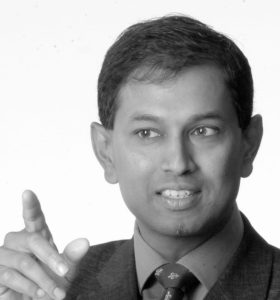
6. How has your perspective on success evolved throughout your career?
Over the years, my perspective on success has changed significantly. I think that for many people success is about making money and having financial security. While financial gains are important, they aren’t the sole measure of success. I think of success in terms of building relationships, learning, value addition, being articulate and caring for yourself. I believe that investing time in holistic development automatically becomes a precursor to success.
I find fulfillment in helping others, especially young people and entrepreneurs, in building their careers. For example, recently I created and ran a two day course for lawyers at Dentons, Mauritius, on business development and building relationships. This interactive course was both personally fulfilling, a lot of fun and an opportunity to learn for the attendees and me.
7. What are your most important life values, and how have they contributed to the progression of your career?
Looking back, I can confidently say that my family, my health, and my friends, are much more important than money. It’s not like financial stability isn’t important for survival, but so is having the support of your family and friends.
So, all the money I’ve invested, if I lost every single penny today, my family and I will still have a roof over our heads and will not go hungry. I’m in a very fortunate position that I am able to take that view. Not everybody’s able to do that. As Naval Ravikant said “Money won’t solve all your problems, but it will solve your money problems”.
Another thing I always like to say is that never bet money you can’t afford to lose. I believe it is the fastest way of ruining your life. This happens all the time when people gamble or invest their money without understanding anything about it. For instance, I’m often asked if I have invested money in cryptocurrency. I always give the same answer; I haven’t because I don’t understand how it works, and I don’t invest in stuff I don’t understand.
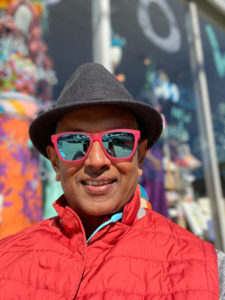
8. How would you describe your leadership style, and how has it evolved over time?
No one thought about leadership when I was growing up. No one thought you had to learn to be a leader to have a successful career. So, I literally learned on the job. And it’s simply to be human. Empathy is at the core of my leadership style. There’s a wonderful word for this in Italian: simpatico which roughly translates to being likeable and easy to get on with. I believe being human, empathetic and developing your emotional intelligence are the most critical aspects of good leadership. People can acquire technical skills such as understanding balance sheets, analyzing profits and losses, and mastering organizational management. But being empathetic and fostering the ability to connect with others are foundational to good leadership.
To conclude, leadership is about understanding and applying your best qualities. It is surrounding yourself with good people to make up for any shortcomings and building a collective vision. A good leader doesn’t have to know everything but must nurture an environment where people can build on their strengths. Being a good leader means being intuitive about how others feel, understanding their reasons, listening more than talking and being able to make hard decisions with empathy and kindness. Because it’s your responsibility as a leader to look after the people who stand by you.
9. What excites you the most about the work you do now?
The excitement comes from the journey itself – backing people, building relationships, and learning new things. I’ve discovered that in every interaction, there’s always something new to discover. I see each investment as an opportunity to support entrepreneurs and, hopefully, find a pot of gold at the end of the rainbow.
10. How do you think your life journey has uniquely prepared you for the role that you are in today?
I don’t think anything can really prepare you for life. I think it’s up to you to prepare yourself but of course seek and get help from others. In hindsight, qualities like willingness to take risks, adaptability, and understanding my limitations have majorly enhanced my life. I understood very early on that I was not an entrepreneur. Being an entrepreneur requires so much hard work, mental resilience, and stamina. I learnt very early that whilst these were qualities I possessed; I was better at helping entrepreneurs achieve their goals. This is something I believe I got good at (through good and bad experiences) and have thoroughly enjoyed it.
I believe that knowing your own limitations, strengths, and abilities, helps you determine where you can add value. I’ve learned through trial and error, through making mistakes, and eventually making up for those mistakes. Also, the adage about surrounding yourself with smarter people and people with skills and strengths you don’t have is so true. So, Vishal provides me with many of the skills I don’t have, especially with his background as an investment banker and financial adviser.
Someone wise gave me this advice. Be watchful over what you love because you become what you desire.
- If you worship money and things, then you will never have enough and never feel you will have enough.
- If you worship your own body, beauty and sexual allure, you will always feel ugly and when time and age take its toll you will die a million deaths before you are buried.
- If you worship power, you will feel weak and afraid, and you will forever need more power over others to keep the fear at bay.
- If you worship your intellect and being seen as smart, you will end up feeling stupid, a fraud, always on the verge of being found out.
11. If you could go back and do one thing differently in your career, what would it be?
There are always things that you could have done differently. But I don’t believe in thinking too much about them because I can’t change them. I’ve had a journey that has been interesting, ups and downs with successes, and failures both on a personal and work front. If I had known then what I know now, would I have done something differently?
Probably, but what I learned from my experiences has made me who I am today. If you take that away from your past, what’s left for you to look back on? The lessons I learned from my past have been instrumental in helping me build a secure future for myself and my family. Additionally, I think that being stuck in the past never does anyone good, we as humans are forward-facing individuals for a reason.
Conclusion:
Raj Kulasingam’s journey represents the unpredictability of life and the possibilities that await you if you have the guts to take chances and grab opportunities. From his roots in Malaysia to his diverse career as a lawyer, investor and NED, Raj’s story demonstrates the power of learning by doing, taking calculated risks, and staying true to personal values and most importantly living by his mantra of ABC. Always Be Curious!!!

